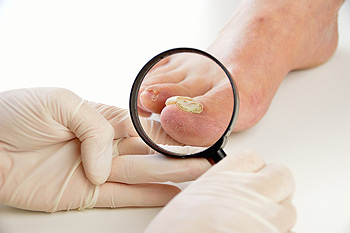Fungal nail infect ions can occur in both the toenails and fingernails. These fungi tend to live in warm and moist environments, and they like to feed on the keratin that makes up the toenails. Fungal nail infections can be commonly spread in environments such as locker rooms and public pool areas, but they can also spread from poor foot hygiene. Nails that have been affected typically appear as yellow or brown, and they can become thicker. If the infection worsens, the affected nail could begin to crumble and accumulate debris that smells foul. Toenail fungal infections are difficult to completely heal on their own, so it is important to seek medical attention if you see any signs or symptoms. A podiatrist will provide a proper diagnosis and determine a treatment plan that is best for you.
ions can occur in both the toenails and fingernails. These fungi tend to live in warm and moist environments, and they like to feed on the keratin that makes up the toenails. Fungal nail infections can be commonly spread in environments such as locker rooms and public pool areas, but they can also spread from poor foot hygiene. Nails that have been affected typically appear as yellow or brown, and they can become thicker. If the infection worsens, the affected nail could begin to crumble and accumulate debris that smells foul. Toenail fungal infections are difficult to completely heal on their own, so it is important to seek medical attention if you see any signs or symptoms. A podiatrist will provide a proper diagnosis and determine a treatment plan that is best for you.
For more information about treatment, contact Donald Manger, DPM of Associated Podiatric Physicians, PA. Our doctor can provide the care you need to keep you pain-free and on your feet.
Toenail Fungus Treatment
Toenail fungus is a condition that affects many people and can be especially hard to get rid of. Fortunately, there are several methods to go about treating and avoiding it.
Antifungals & Deterrence
Oral antifungal medicine has been shown to be effective in many cases. It is important to consult with a podiatrist to determine the proper regiment for you, or potentially explore other options.
Applying foot powder on the feet and shoes helps keep the feet free of moisture and sweat.
Sandals or open toed shoes – Wearing these will allow air movement and help keep feet dry. They also expose your feet to light, which fungus cannot tolerate. Socks with moisture wicking material also help as well.
If you have any questions please feel free to contact our office located in Hamilton Township, NJ . We offer the newest diagnostic tools and technology to treat your foot and ankle needs.
